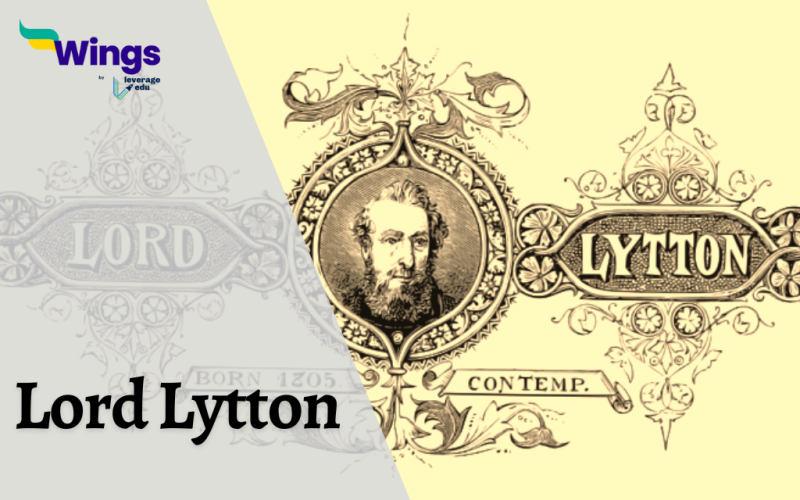Edward Robert Bulwer-Lytton, 1st Earl of Lytton, was Viceroy of India from 1876 to 1880. His tenure was marked by both controversy and achievement, and he remains a complex and enigmatic figure in Indian history. In this blog, we will delve into the life of Lord Lytton and his contributions to the history of India.
Table of Contents [show]
Who was Lord Lytton?
Edward Robert Bulwer-Lytton, 1st Earl of Lytton, GCB, GCSI, GCIE, PC (8 November 1831 – 24 November 1891) was an English statesman, Conservative politician and poet who used the pseudonym Owen Meredith. He was born in London to Edward Bulwer-Lytton, 1st Baron Lytton, a novelist and politician, and Rosina Doyle Wheeler.
He was educated at Harrow School and the University of Bonn. He entered the diplomatic service in 1849 and served in various European cities, including Florence, St Petersburg, Vienna, and Paris. After his return from India, he served as British Ambassador to France from 1887 to 1891. He died in Paris in 1891 at the age of 59.
Also Read – Full List Of Viceroys Of India
Appointment as Viceroy of India
He was appointed Viceroy of India in 1876 and served until 1880. He served as a government minister under both Lord Palmerston and Benjamin Disraeli. In 1875, Disraeli appointed Lytton as Viceroy of India. Lytton was a controversial choice, as he had no previous experience in India or Asia. However, Disraeli was impressed by Lytton’s intelligence and ambition and believed that he was the right man to lead India through a period of change and upheaval.
Role in India
Lytton’s tenure as Viceroy of India was marked by a number of significant events, including:
- The Great Indian Famine of 1876-78, which caused millions of deaths.
- The Second Anglo-Afghan War (1878-80).
- The proclamation of Queen Victoria as Empress of India in 1877.
The Second Anglo-Afghan War
The Second Anglo-Afghan War was fought between Britain and Afghanistan from 1878 to 1880. The war was caused by a number of factors, including Britain’s desire to secure its borders in India and its rivalry with Russia. Lytton played a key role in the decision to go to war, and he personally directed the war effort. The war was a costly victory for Britain, and it led to a lasting mistrust between Britain and Afghanistan.
The Great Indian Famine of 1876-78
The Great Indian Famine of 1876-78 was one of the worst famines in Indian history. The famine was caused by a combination of drought and crop failure. Lytton’s government was criticized for its slow response to the famine, and for its continued export of grain from India during the famine. Millions of people died in the famine.
Also Read- Lord Wellesley: Background, Rule, Significant Events
Legacy and Controversies of Lord Lytton
Lytton’s legacy is complex and controversial. Some of the legacies that he is credited with are
- The introduction of the Indian Civil Service exam and reserving one-sixth of the civil service posts for Indians.
- The expansion of the Indian railway network.
- He established the University of Allahabad.
- He also introduced a number of social reforms, such as the abolition of sati and child marriage.
However, he is also criticized for his handling of the Second Anglo-Afghan War and the Great Indian Famine. He was a brilliant and ambitious man, but he was also arrogant and insensitive. He was a strong advocate of British imperialism. He was ultimately a tragic figure, whose legacy is marred by the controversies of his time.
Other Achievements
Some of the other achievements of Lord Lytton which are etched in history are –
- Proclaimed Queen Victoria as Empress of India in 1877.
- Abolished internal customs barriers.
- Decentralized the financial system.
- Reserved one-sixth of the civil service posts for Indians.
- Supervised effective measures for famine relief.
- Founded the Imperial Forest Department.
- Established the Mayo College in Ajmer.
Also Read – Lord Canning: First Viceroy of India, Life, Works
Lytton was a talented poet and novelist, but he was also a ruthless and ambitious politician. He published several volumes of poetry under the pseudonym Owen Meredith. His most famous novel is Lucile (1860). Lord Lytton’s tenure as Viceroy of India was marked by a number of significant events, both positive and negative. Lytton’s son, Victor Bulwer-Lytton, also served as Viceroy of India from 1921 to 1925.
For more such interesting and informative topics on Indian History and more, stay tuned to our General Knowledge section. If you want to know more about studying abroad, reach out to our experts on Leverage Edu!
 One app for all your study abroad needs
One app for all your study abroad needs















 45,000+ students trusted us with their dreams. Take the first step today!
45,000+ students trusted us with their dreams. Take the first step today!
